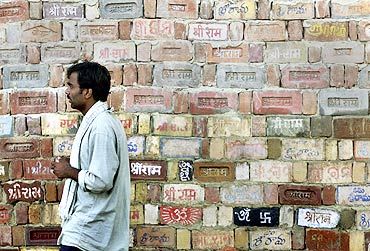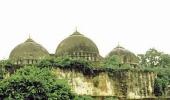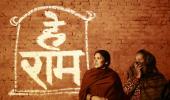
Uttar Pradesh Shia Waqf Board on Monday proposed relinquishing its right over the disputed land in Ayodhya, and building a 'masjid-e-aman" in Lucknow to resolve the Ram janmabhoomi-Babri masjid tangle, a move rejected by the Muslim protagonists involved in the protracted legal feud.
The board, which is the 'mutawalli' (caretaker) of the Babri Mosque, has proposed giving up its right over the land in Ayodhya, and a draft for resolving the issue, prepared by the Shia Waqf Board, has been submitted in the Supreme Court on November 18, its chairman Wasim Rizvi told reporters.
Claiming that the formula for resolving the matter proposed by the Shia Waqf Board was the best, Rizvi said it is of the view that instead of Ayodhya, a 'masjid-e-aman' (the mosque of peace) be constructed in Lucknow's Hussainabad area.
The board, he said, has requested the government to provide a one acre plot for it.
The proposal, however, did not go down well with the All India Muslim Personal Law Board.
"On whose behalf has he brought this draft proposal? He (Rizvi) does not enjoy the confidence or recognition of either the Sunni sect or the Shia sect," AIMPLB counsel in the case and its senior member Zafaryab Jilani said.
Jilani, who is also the convenor of Babri Masjid Action committee, referred to some legal shortcomings in the draft proposal.
"The Shia Board has no authority over the disputed land as the Allahabad high court, in 2010, had ruled a three-way division of the disputed 2.77-acre area at Ayodhya among Sunni Waqf Board, Nirmohi Akhara and Lord Ram Lalla...the Shia board has no right over any part of the land," he said.
Moreover, Jilani said since the Shia Waqf Board did not appeal against the high court's decision, it meant that the ruling, which was binding on all till the Supreme Court announced its judgement, was acceptable to them.
Rizvi, however, rejected the claim of UP Sunni Central Waqf Board over the disputed site, saying that the Allahabd high court had given the land to Muslims and not to Sunni Waqf Board.
Chairman of the UP Sunni Central Waqf Board Zafar Farooqui said any claim can be accepted or rejected only by the court "...our involvement has been since 1961 and it is being rejected by the Shia Board now...he (Rizvi) does not have the authority to do so..."
Rizvi, he said, has been chairman of the board since 2006-07, and could have spoken on the subject even when the case was being heard by the Lucknow bench, which came up with its verdict in 2010, or in the Supreme Court where the hearing is going on for the last seven years.
"It is absurd. He has been silent on it ever since and has become active only now. The case is going on in the highest court of the country. Whatever he has to say, he should do it in the court. What's the relevance of releasing his formula to the media?" he said.
Jilani alleged that Rizvi was "working overtime to please certain forces in order to serve his personal motives".
Rizvi, who addressed the press conference along with Mahant Narendra Giri, chairman of the All India Akhara Parishad, alleged that the Shia Board's views on the matter were never put forward in a forceful manner because the lawyers deployed for the purpose were "fake".
Referring to the criticism of his recent actions, Rizvi said it was because the board was never given any court copy and that it was not aware that lawyers were pleading on its behalf.
It was only on March 21, 2017, when the apex court said that talks could be initiated for mutual agreement to end the dispute that the Shia Waqf Board looked into the files in detail only to find that though it is a party in the case it never gave 'wakalatnama' to the counsel appearing on its behalf, Rizvi said.
"It is a matter of probe that the case is being pursued by overlooking the actual claimant which is the Shia Board...I have requested the central and state governments to get it enquired as to who had fielded the lawyers on our behalf," he said.
On Rizvi's allegations regarding fake counsel, Jilani said that it should be probed by the Shia board itself.
Jilani, however, said that he had never seen any counsel pleading on behalf of the Shia Board in the court.
On the role of AIMPLB, Rizvi said it (board) should have come forward for a dialogue but since it did not take the initiative, Shia board had to come forward.
Giri said a Ram temple in Ayodhya will be constructed and that an amicable settlement should be reached on the issue by talking to all the parties concerned.
The apex court had on August 11 said it would commence the final hearing in the long-standing Ram Janmabhoomi-Babri Masjid title dispute from December 5, a day before the 25th anniversary of the demolition of the medieval-era structure.
The court had reached a consensus on commencing the hearing on a total of 13 appeals filed against a 2010 judgement of the Allahabad High Court in four civil suits.
The high court had ruled a three-way division of the disputed 2.77 acre area at Ayodhya among the parties -- the Sunni Waqf Board, the Nirmohi Akhara and Lord Ram Lalla (deity).
A three-judge bench of the Allahabad high court, in a 2:1 majority ruling, had said the land be partitioned equally among three parties -- the Sunni Waqf Board, the Nirmohi Akhara and Ram Lalla.










 © 2025
© 2025